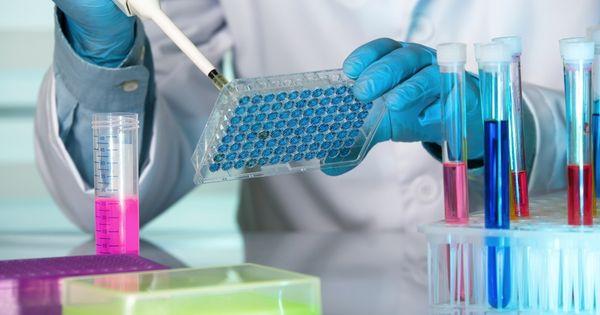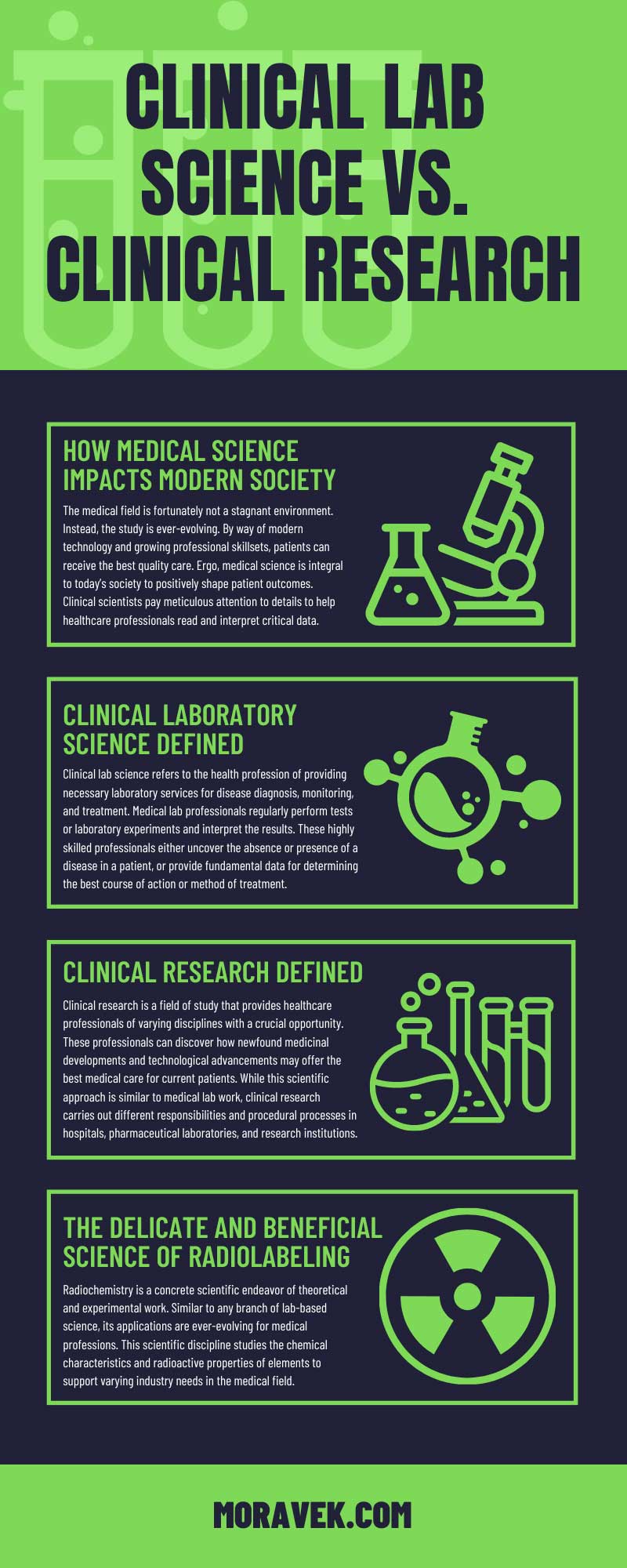
What defines a genuine, sound scientific endeavor? As Carl Sagan recognized, “there is much more wonder in science than in pseudoscience. And in addition, to whatever measure this term has any meaning, science has the additional virtue, and it is not an inconsiderable one, of being true."
While pseudoscience seeks confirmation to support its claims, a study of science seeks out evidence that might prove something false. Understanding this definition is essential for scientific exploration, especially in the medical field. The work scientists complete in the lab or field for research projects benefits patients beyond measure—if the wonderous findings prove effective after trials, challenges, and investigations.
Medical scientific studies branch into two career categories: clinical laboratory scientists and clinical researchers. Let’s closely examine the similarities and differences between clinical lab science vs. clinical research; here is what to know about the essential roles of thesescientific endeavors in present-day healthcare.
How Medical Science Impacts Modern Society
The medical field is fortunately not a stagnant environment. Instead, the study is ever-evolving. By way of modern technology and growing professional skillsets, patients can receive the best quality care. Ergo, medical science is integral to today’s society to positively shape patient outcomes. Clinical scientists pay meticulous attention to details to help healthcare professionals read and interpret critical data.
Similarly, clinical research sets the foundation for medical education and understanding. With advanced technology and equipment, medical laboratories are the steady backbone that enables accurate diagnosis and treatment of diseases. A clinical scientist or specialist can test and analyze samples to gain life-changing medical information; this knowledge significantly impacts the future of human health and longevity.
Detailed Analysis: The Groundwork of Treatment and Diagnosis
Besides using scientific knowledge for detailed diagnostic analysis, clinical research influences the development of medical advancements. The analyses performed by biology- or chemistry-based scientists in the lab or the field provide a means for discovering significant breakthroughs. Whether through drug discovery and development, biotechnology, or medical devices, these scientific advances can extend or save the lives of patients.
Health Science Careers: Patient-Facing vs. Laboratory Settings
When considering clinical lab science vs. clinical research healthcare roles, understand that both are inspiring and meaningful careers. However, one helps build the future of medicine, while the other helps to identify and administer its current benefits. Only together can both advance clinical knowledge and improve patient care, whether through interacting with a patient for a study, performing laboratory testing, or specially researching behind the scenes.
Clinical Laboratory Science Defined
Clinical lab science refers to the health profession of providing necessary laboratory services for disease diagnosis, monitoring, and treatment. Medical lab professionals regularly perform tests or laboratory experiments and interpret the results. These highly skilled professionals either uncover the absence or presence of a disease in a patient, or provide fundamental data for determining the best course of action or method of treatment.
The Role of Clinical Lab Scientists
Accredited and certified clinical laboratory professionals are the cornerstone of high-quality testing and reliable analysis for medical breakthroughs. Professionals must have deep knowledge of laboratory instrumentation and testing methodologies. The use of sophisticated technology and state-of-the-art lab equipment supports problem-solving, data integration, and the evaluation of new testing methods.
After completing a bachelor’s degree in clinical or medical laboratory science, many medical lab science professionals choose to work primarily in hospital, forensic, or research laboratory settings. Alongside traditional degree-related coursework, these scientists must also undergo clinical rotations to gain hands-on experience and knowledge. This clinical understanding plays a key role in providing personalized care and consulting with physicians, even if the work does not directly involve interacting with patients. The reliability and implications of laboratory results can change or save lives.
Clinical Research Defined
On the contrary, clinical research refers to the study of medical treatments or medications on human research subjects. This vital form of medical research and examination involves the extensive use of strictly controlled clinical trials. Clinical research requires voluntary human participation to evaluate the effectiveness of new or emerging treatment drugs or prevention strategies.
Clinical research is a field of study that provides healthcare professionals of varying disciplines with a crucial opportunity. These professionals can discover how newfound medicinal developments and technological advancements may offer the best medical care for current patients. While this scientific approach is similar to medical lab work, clinical research carries out different responsibilities and procedural processes in hospitals, pharmaceutical laboratories, and research institutions.
The Role of Clinical Researchers
After acquiring a bachelor's degree in life sciences, clinical research professionals generally obtain graduate-level education and certification. Along with educational coursework, clinical researchers must undergo clinical rotations and gain laboratory experience with independent research. If directly overseeing or administering medical services to human participants, these professionals must be licensed clinical research physicians.
The typical role of clinical researchers is to design and conduct ethical scientific investigative studies that aim to improve overall health outcomes or provide answers to human medical and behavioral inquiries. Research professionals must measure outcomes to investigate the safety and efficacy of the intervention. For this reason, they must also ensure the standardization of drugs, doses, and potency to receive reliable results throughout the lengthy and careful trial process.
The Delicate and Beneficial Science of Radiolabeling
Radiochemistry is a concrete scientific endeavor of theoretical and experimental work. Similar to any branch of lab-based science, its applications are ever-evolving for medical professions. This scientific discipline studies the chemical characteristics and radioactive properties of elements to support varying industry needs in the medical field. Radiochemists apply the advantageous uses of radioactive materials with innovative techniques, including the radiolabeling of active pharmaceutical ingredients.
For dedicated explorers of the medical world, custom API radiolabeling is a scientific technique supporting the completion of pharmaceutical research. Clinical radiolabel studies help provide a greater understanding of the absorption, distribution, and metabolism of drugs in humans.
Quality Matters: Moravek Quality Services
Professionals in this area of expertise must have a thorough understanding of good clinical practices and quality systems for manufacturing cGMP APIs. Experienced radiochemistry specialists can complete the appropriate scope of work to meet the clinical requirements of specific medical studies or research team projects.
Companies or research institutions searching for radiolabeled compounds suppliers can contact Moravek for quality solutions. Moravek is a trusted contract organization dedicated to the ongoing advancement of human health. Our QC laboratory team fully supportsmedical research and clinical trials completed around the globe.Get in touch today to gain support and facilitate successful clinical research.

